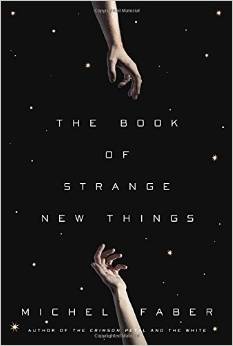Once upon a time, God asked Moses what country he wanted for his people. Moses wanted California, but being a stammerer, he only managed to say: “Ca…Ca…Ca…” Replied God: “You want Canaan, you’ll get Canaan!”
It’s an old joke, but after enduring the Israeli election on spring break in Yosemite and the Bay Area (Point Reyes to Palo Alto, the Golden Gate to the Berkeley Hills), I do wish Moses hadn’t had that speech impediment. On the other hand, unless it rains during next year’s rainy season, California is going to look like Canaan pretty soon.
Speaking of climate change (which I can, not being employed by the State of Florida), I spent part of the time reading The Book of Strange New Things, British author Michel Faber’s remarkable new novel about an evangelical pastor’s mission to the inhabitants of a far-away planet at a time when natural disasters are bringing life as we know it on Earth to an end.
The book has attracted a lot of attention because of its beautiful rendering of the relationship between the pastor and his wife, who is not chosen to go with him — and the biographical fact that Faber’s wife Eva was dying of cancer as he wrote the book. What has attracted much less attention is Faber’s portrait of the husband as Christian missionary.
For reasons that ultimately become clear, Peter Leighton has been signed up for his ministry by USIC, a mysterious multinational corporation that is establishing a colony on the planet Oasis. Thanks to a previous missionary, some of the natives — human-like Oasans — have embraced Christianity and need a new pastor. Leighton brings them the gospel in his preaching, his behavior, and his conveying of the Bible, which they call “The Book of Strange New Things.” (Underscoring the title, the novel’s pages are themselves gilt-edged.)
Peter’s wife is named Beatrice, called Bea (a near anagram of Eva), a nurse who, we learn, rescued and converted him from a life of addiction and crime. The book amounts to the Purgatorio in a kind of reverse Divine Comedy, a journey from Paradise to Hell, so to speak — but let me not give too much away. Peter comes out of it a better man, though a more troubled Christian. While the Earth is sliding into chaos, he does not expect an imminent Rapture, believing that the pre-millennialist End Times scenario is based on a misreading of Scripture.
I’d like to know what Americans evangelicals make of Peter, but perhaps because Faber does not claim to be a Christian, The Book of Strange New Things seems to have attracted little notice in their circles. For my money, it’s got a lot more going for it, religiously speaking, than the sci-fi allegories of C.S. Lewis.






